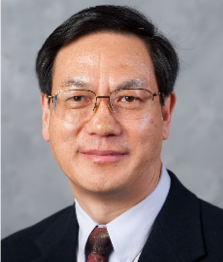Lecture Summary
Biography
Piezotronics and Piezo-phototronics of ZnO
Zhong Lin WANG
Beijing Institute of Nanoenergy and Nanosystems, Chinese Academy of Sciences School of Materials Science and Engineering, Georgia Institute of Technology ,USA
Piezoelectricity, a phenomenon known for centuries, is an effect that is about the production of electrical potential in a substance as the pressure on it changes. For wurtzite structures such as ZnO and GaN, due to the polarization of ions in a crystal that has non-central symmetry, a piezoelectric potential (piezopotential) is created in the crystal by applying a stress owing to the presence of one atomic-layer thick polarization charges at the surface/interface. Electronics fabricated by using inner-crystal piezopotential as a “gate” voltage to tune/control the charge transport behavior is named piezotronics, with applications in strain/force/pressure triggered/controlled electronic devices, sensors and logic units. Piezo-phototronic effect is a result of three-way coupling among piezoelectricity, photonic excitation and semiconductor transport, which allows tuning and controlling of electro-optical processes by strain induced piezopotential. The objective of this talk is to introduce the fundamentals of piezotronics and piezo-phototronics and to give an updated progress about their applications in human-machine interfacing, optoelectronics, sensors and chemistry (LED, solar cell, photon detectors, photon catalysis).
Piezotronics and Piezo-phototronics of ZnO
Zhong Lin WANG
Beijing Institute of Nanoenergy and Nanosystems, Chinese Academy of Sciences School of Materials Science and Engineering, Georgia Institute of Technology ,USA,
Dr. Zhong Lin Wang is the Director of the Beijing Institute of Nanoenergy and Nanosystems, and Regents’ Professor and Hightower Chair at Georgia Institute of Technology. Dr. Wang pioneered the nanogenerators from fundamental science to technological applications. His research on self-powered nanosystems has inspired the worldwide effort in academia and industry for studying energy for micro-nano-systems. He coined and pioneered the fields of piezotronics and piezo-phototronics for the third generation semiconductors. Among 100,000 scientists across all fields worldwide, Wang is ranked #5 in career scientific impact, #1 in Nanoscience, and #2 in Materials Science. His google scholar citation is over 280,000 with an h-index of over 256.
Dr. Wang has received the Celsius Lecture Laureate, Uppsala University, Sweden (2020); The Albert Einstein World Award of Science (2019); Diels-Planck lecture award (2019); ENI award in Energy Frontiers (2018); Global Nanoenergy Prize, The NANOSMAT Society, UK (2017); Distinguished Research Award, Pan Wen Yuan foundation (2017); Distinguished Scientist Award from (US) Southeastern Universities Research Association (2016); Thomas Router Citation Laureate in Physics (2015); Distinguished Professor Award (Highest faculty honor at Georgia Tech) (2014); The James C. McGroddy Prize in New Materials from American Physical Society (2014); MRS Medal from Materials Research Soci. (2011).
Dr. Wang was elected as a foreign member of the Chinese Academy of Sciences in 2009, member of European Academy of Sciences in 2002, academician of Academia of Sinica 2018, International fellow of Canadian Academy of Engineering 2019; Foreign member of the Korean Academy of Science and Technology 2019; fellow of American Physical Society in 2005, fellow of AAAS in 2006, fellow of Materials Research Society in 2008, fellow of Microscopy Society of America in 2010, fellow of the World Innovation Foundation in 2002, fellow of Royal Society of Chemistry, and fellow of World Technology Network 2014. Dr. Wang is the founding editor and chief editor of an international journal Nano Energy, which now has an impact factor of 16.6. Details can be found at: http://www.nanoscience.gatech.edu

